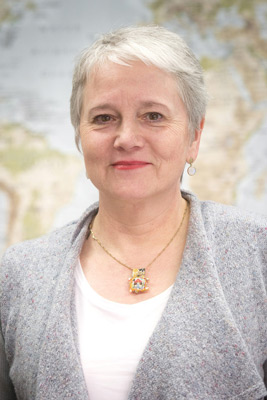Professor Ludwine Messiaen, Ph.D., a long-term faculty member of the Department of Genetics who established and directed the Medical Genomics Laboratory at the University of Alabama at Birmingham (UAB), has passed away. Our deepest condolences go out to her family, friends, and colleagues.
Messiaen was an internationally-renowned scientist known for her critical work in advancing the studies of the molecular diagnosis of the various forms of neurofibromatosis, as well as her pioneering work in genotype/phenotype studies. Dr. Messiaen was the first to set up a comprehensive test for NF1 and for a long time her lab was the only place in the world to obtain such testing.
With her innovative research, she was able to permanently shape the future of NF research. In addition to diagnostic testing, her lab was the first to identify the role of the LZTR1 gene in some individuals with schwannomatosis. In 2018, she received the Children’s Tumor Foundation’s Friedrich Von Recklinghausen award, the highest honor in NF research.
Bruce Korf, M.D., Ph.D., associate dean of Genomic Medicine and Chief Genomics Officer, and past chair of the Department of Genetics, was the person who recruited her to UAB because of their mutual interest in NF, and discussed with her the possibility of creating a lab expanding on that interest while also facilitating other genetic testing opportunities. He expressed that Messiaen’s work ethic made her an outstanding colleague.
“A couple of things typified her approach. One was her tremendous scientific acumen and expertise that you needed to tackle a complicated genetic entity, and the other was always putting the patient’s need at the top of mind,” said Korf.
The work that Dr. Messiaen conducted as the director of the Medical Genomics Laboratory has contributed greatly to science as well as patient care, and is a source of enormous pride to UAB and to the community. If anyone in the world wanted to find out the best place is to get NF testing, Messaien’s lab at UAB was invariably at the top of the list.
“She became known for going the extra mile to sort out complicated genetic variants that other groups would not be willing or able to do. If there was a patient that had an unusual genetic change or clinical presentation, she would do anything she had to do to sort out the molecular basis for the person’s problem. She would interact with clinicians globally to help these patients, and was widely respected both for her extraordinary skills and dedication.”
Deeann Wallis, Ph.D., Professor of the Department of Genetics, spoke about how Messiaen’s attention to detail with her work and how it led to her improving her professional capabilities.
“Ludwine was the undisputed world’s leader in NF1 diagnostics, and it was her life’s work,” said Wallis. “She pioneered it. Her advice regarding NF1 conventions was listened to by all. Her comprehensive knowledge was so impressive.”
Current assistant professor of the Genetic Counseling Program Alicia Gomes worked closely with Messiaen for nearly 11 years, and spoke on the lasting impact that her work has left behind.
“No matter what aspect we were working in together, her persistent attention to detail and requirement for almost perfection was transparent through everything that we did,” said Gomes.
As part of Dr. Messiaen’s legacy, her lab allows those who currently work within it the ability to push the needle on what they can do to improve what is available for patients not just at UAB, but worldwide.
“I think it was her refusal to accept whatever was common form for things is why we were able to identify these unique genes associated with disorders that we work on that had not been identified before, and is the reason why the lab was able to make many genotype/phenotype correlation papers that did not exist before.”
Many of her colleagues expressed how efficiently Dr. Messiaen exemplified professionalism and thoroughness throughout her career, and how much her legacy resonates even after her passing. Dr. Messiaen’s unique talents were apparent to all who worked with her, and she inspired others to overcome their own personal challenges in life.
Fady Mikhail, M.D., Ph.D., Director of the Cytogentics Laboratory of the Department of Genetics, spoke on the qualities of Messiaen which made her a great colleague.“Her knowledge, meticulousness, and attention to details was something that I always admired. Her passion about NF1 and related disorders was always felt by all those who interacted with her,” said Mikhail. “With her passing away, it is such a great loss to the genetics community. The Department of Genetics at UAB will surely miss her, but her memory will always live with those of us who were fortunate to work with her.”
She retired in 2021 after a very long and successful career.